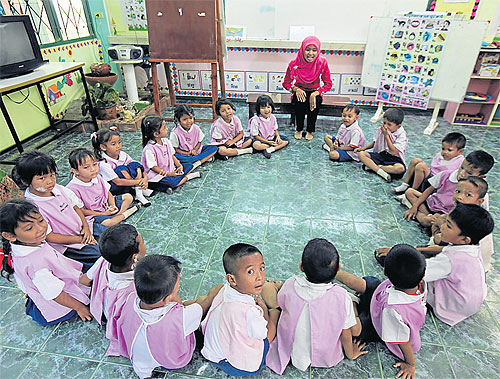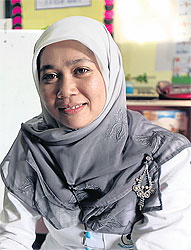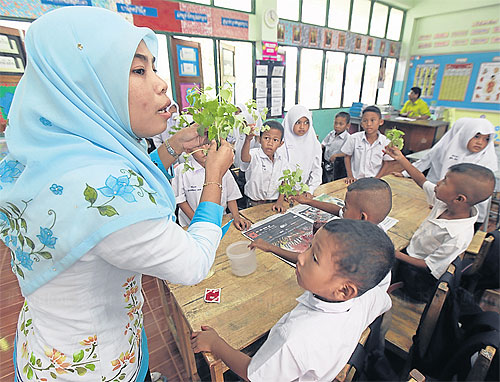The science class for grade two students at Thairath Wittaya 10 school entails a lot more than science.

Kindergarten children at Thairath Wittaya 10 school learn Pattani-Malay, their mother tongue, as their first language.
When their teacher asks them questions about the different parts of a plant in the Pattani-Malay language, the students readily respond in Thai. Throughout the entire period, conversation flows naturally back and forth between the two languages, and there are no signs of confusion among any of the pupils.
All classes at this Narathiwat primary school are conducted bilingually. Pattani-Malay, the pupils' mother tongue, is taught first, beginning in kindergarten. The Thai language is then gradually introduced to them step-by-step in the higher grades.
"In most schools in the southern provinces, where everything is taught in Thai, we found that children have a hard time adjusting to the curriculum because they are not familiar with Thai," said Rangsun Wiboonuppathum, Unicef Thailand's Chief of Education.
"When pupils don't understand what their teachers are saying, they hardly participate at all and school is not a fun place for them to be."
PILOT PROJECT
Studies have shown that the academic performance of children in the deep South is among the lowest in the country. According to an evaluation on the quality of education conducted by the Office of the Basic Education Commission in 2008, more than 25% of grade three children in the southern border provinces could not read, while 42% could not write.

Assanah Binsulong, a teacher at Thairath Wittaya 10 school, found pupils are much happier and faring better in class after the school adopted the bilingual education programme.
Thairath Wittaya 10 school is among 16 pilot schools participating in the Mother Tongue-Based Bilingual/Multilingual Education Programme for Pattani-Malay speaking children in the provinces of Narathiwat, Pattani, Yala and Satun. The bilingual scheme, supported by Unicef and Mahidol University, was introduced in 2008 in an effort to improve academic performance and preserve the local language and culture in the deep South, where the majority of the population are Muslim and largely speak Pattani-Malay.
"Brain development is the most important thing for young children, especially in kindergarten," said Rusdee Masor, a researcher at Mahidol's Research Institute for Language and Cultures of Asia. "Language should not be a barrier to children's learning and development. Kindergarten teachers and pupils must speak the same language. If they cannot understand each other, the children will not be stimulated to learn."
Rusdee, who is also working on the bilingual programme, said research conducted in other countries by Unesco and other like-minded organisations has shown that the use of the pupils' mother tongue in school can improve learning.
In 2006, Mahidol University carried out a survey among parents in the far South and found that 66% of them wanted their children to learn Pattani-Malay at school through the use of the Thai alphabet.
At the pilot schools, Pattani-Malay is used as the main teaching language for pupils from kindergarten to grade one, while Thai and English are gradually introduced in later years. Teachers are also trained to use different types of learning materials and to employ systematic teaching methods.
To adapt the Thai alphabet for Pattani-Malay, 30 new Thai characters with diacritic marks were developed by linguistics experts. Researchers, teachers, parents and local communities have also been involved in making reading and writing easier for the children.
POSITIVE CHANGES
"I speak Pattani-Malay at home but I learn Thai, Pattani-Malay and English at school," said Sufeyah Kahong, nine, a grade three student at Baan Prachan school in Pattani, who spends her free time reading books. "I like coming to school because I learn new things."
Teachers said they have worked harder and are happier because the children are happier and do better in class. They have noticed that the children now come to school early, are absent less often and are much more self-confident and enthusiastic in class.
"We've seen many positive changes," said Assanah Binsulong, a teacher at Thairath Wittaya 10 school. "In the past, students couldn't even read a simple word. All they did was memorise things. Now, even kindergarten pupils can read well and create simple sentences. During the break, they run to grab books instead of running around outside. When they have fun, their school performance is better."
Many parents said they want their children to attend schools that offer the bilingual education programme. Waesah Waehaji, a mother of three young children at Baan Prachan school, said her children can read and write in Pattani-Malay and Thai with no difficulty. Other parents said their children now ask a lot of questions and are always trying to read signs.
"My two daughters have attended the bilingual programme since kindergarten and they are doing better in school than their brother who did not attend it," said Waesah. "I can see that my daughters love to read and that they can read quickly."
HARD EVIDENCE
An evaluation of the programme by Yala Rajabhat University in 2010 showed that overall academic achievements in schools has improved. According to tests conducted in four bilingual programme schools and four schools where only Thai is used, children in the bilingual schools scored 35% higher in Thai language skills than students in the Thai-medium schools. In addition, students in the bilingual schools also scored higher in other subjects such as mathematics and science.
The Ministry of Education has encouraged other schools in the deep South to apply bilingual education methods in a bid to improve academic performance and create a more positive attitude towards schooling among the student's parents.
Unicef's Rangsun hopes bilingual education will be adopted in schools in other parts of the country where other minority languages are the children's mother tongue. He said that this will not only help boost academic performance but also help preserve ethnic identity and local culture.
"If children can use both their mother tongue and the Thai language proficiently, they will have improved education and job opportunities when they grow up," Rangsun said. "In addition, it will promote better communication no matter what their mother tongue is, which will help foster understanding and reduce mistrust within their communities."
Watch a video on bilingual education in the deep South at www.youtube.com/unicefthailand

A teacher at Thairath Wittaya 10 school asks grade two students about different parts of a plant in Pattani-Malay language. The class is conducted in both Pattani- Malay and Thai.

A group of grade three students at Baan Prachan school in Pattani province. The bilingual education programme aims to improve academic performance and preserve the local language and culture in the far South, where the majority of the population are Muslim and speak Pattani-Malay.

